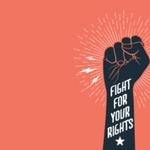RightAct at Bergen Exchanges 2025: Activist strategies in repressive conditions
The RightAct Project was excited to be a part of Bergen Exchanges 2025, with a panel addressing the challenges activists face where the political, financial, and discursive space for rights-based organising is narrowing. The panel was moderated by Matthew Gichohi and featured Ayo Sogunro, Reem Abbas, and Adrian Jjuuko.
The panellists explored how regimes deploy increasingly sophisticated tools to suppress dissent, while international support for human rights and democracy declines. They asked:
- What strategies emerge when traditional channels close?
- How do movements adapt when external solidarity wanes, funding contracts, and repression intensifies?
Strategies in restrictive contexts
Panelists shared examples of the ways activists adjust their goals, tactics, alliances and organizational forms in response to shifting and uncertain political opportunities, constraints and risks. In Nigeria, Ayo Sogunro highlighted how Nigeria has built early strategic alliances, that help fight the illegalities surrounding advocation for the LGBTQ+ community. He further stated that advocates have reverted to community litigation rather than solo litigation, as legal strategies serve communities rather than individuals.
Adrain Jjuuko discussed how Uganda´s Anti-Homosexuality Act has resulted in one of the most severe judicial systems globally. He used the term ‘activism from the closet,’ coined by Hassan El Menyawi, to describe lobbying done behind closed doors and on social media platforms like Facebook, Twitter, and TikTok organising actions in person grows more dangerous.
From Sudan, Reem Abbas argued that there has been an increase in militarisation, anti-women sentiments, and violence against women. She described how women activists face discrimination, harassment, and even honour killings, while being scapegoated in public discourse about the country’s economic hardships. Despite this, Sudanese activists are turning to unifying strategies that focus on issues rather than positions. She also spotlighted women's access to opportunities, with greater economic empowerment and increasing power by utilising safe spaces for women.
Human rights activism workshop
The project continued the discussions at The Human Rights Activism Workshop. Liv Tønnessen launched the program by stressing the value of group reflection in a variety of settings. Ayo Sogunro's (Nigeria) and Adrian Jjuuko's (Uganda) contributions focused on the tenacity of LGBTQ+ activists in the face of anti-gender movements and illegality. Reem Abbas (Sudan), Satang Nabaneh (Gambia) and Abeer Ahmed (Yemen) focused on women’s activism in militarised and religiously challenged environments with examples of the continued practice of female genital mutilation in Gambia, as well as the escalating violence against women in Sudan and Yemen. Godfrey Kanyenze discussed navigating human rights advocacy in Zimbabwe under conditions of scarce international funding, stressing the importance of local resilience and self-reliance.
Based on these important discussions and insights into ongoing activism in repressive conditions, the project plans to publish policy briefs distilling the lessons of the workshop into practical insights for activists and policymakers.
Liv Tønnessen
Lise Rakner
Leonardo Arriola
Project




